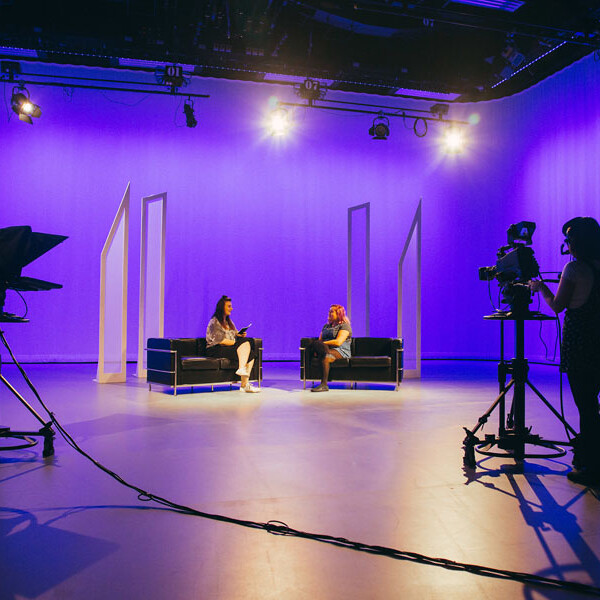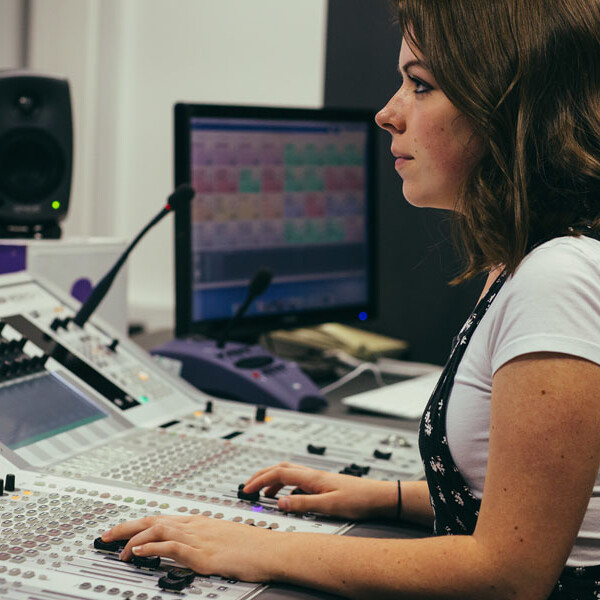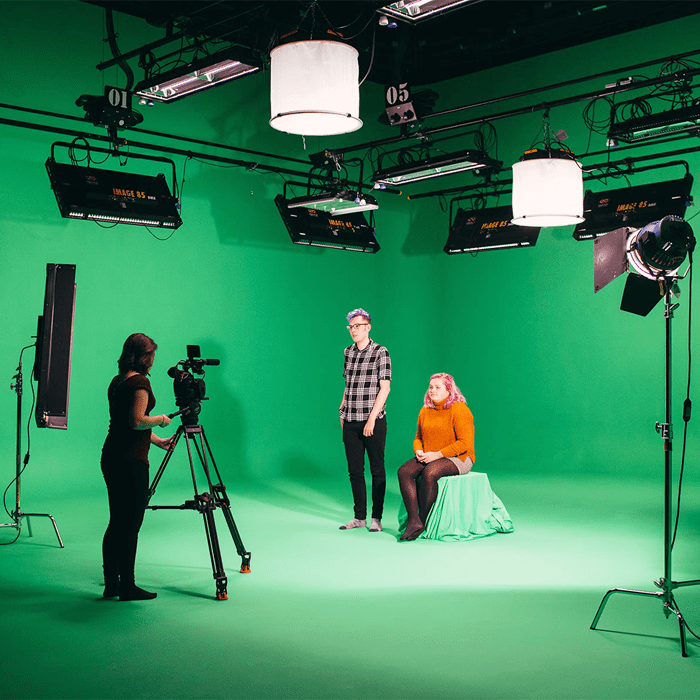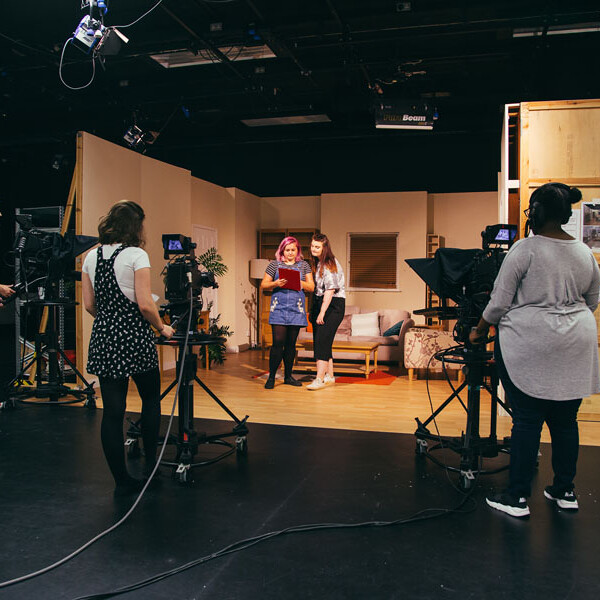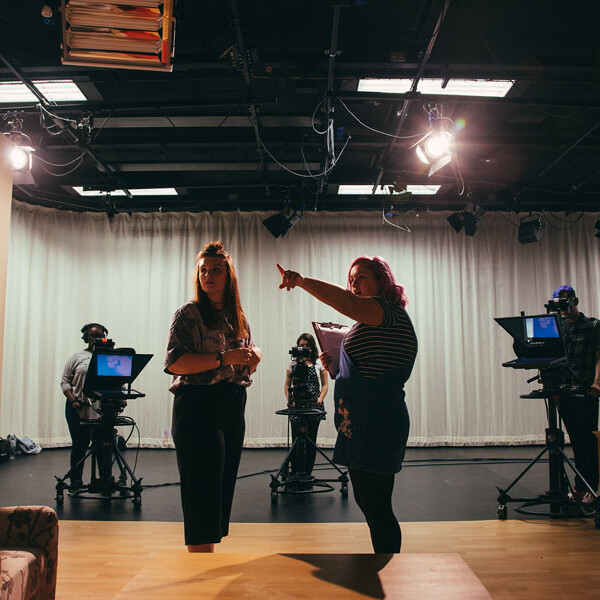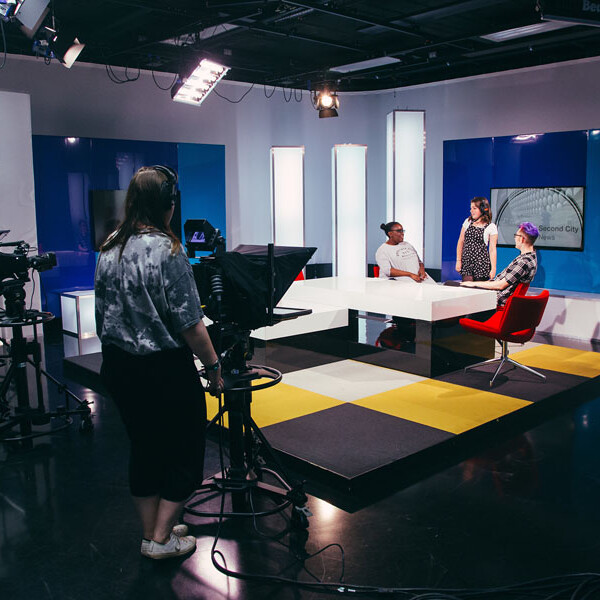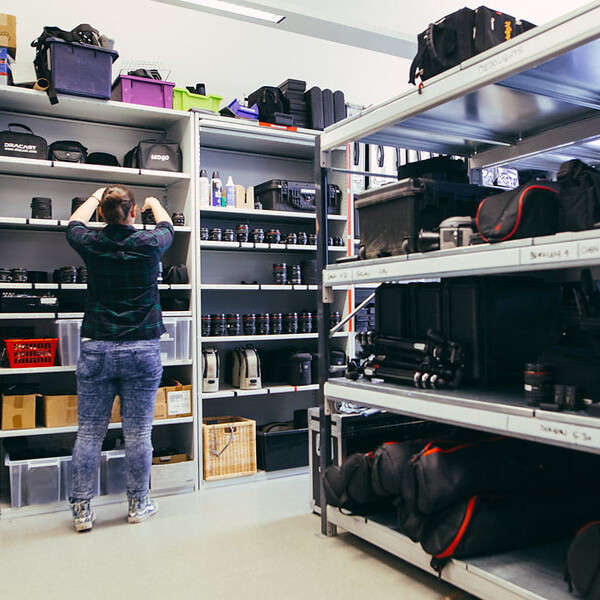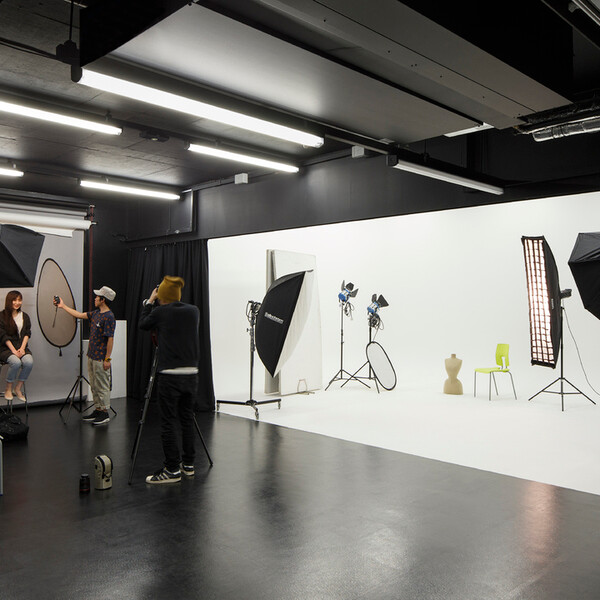
Filmmaking with a Foundation Year - BA (Hons)
Currently viewing course to start in 2025/26 Entry. Switch to 2026/27 Entry
September 2025 — UCAS code P31G
Are you passionate about creating high-production films? Our BA (Hons) Filmmaking with a Foundation Year will develop your technical skills and knowledge to achieve your dream career....
48 points required
Calculate UCAS pointsClearing places available
- Level Foundation
- Study mode Full Time
- Award BA (Hons)
- Start date September 2025
- Fees View course fees
- Subject
- Location City Centre
This course is:
Open to International Students
Overview
Clearing 2025
48 points (or equivalent) is the minimum you will need to be considered for this course in Clearing.
Use the UCAS Tariff Calculator to work out your points.
Are you passionate about creating high-production films? Our BA (Hons) Filmmaking with a Foundation Year will develop your technical skills and knowledge to achieve your dream career.
On this course, you’ll start by exploring fundamental core skills such as media production, academic writing, researching and collaborative practice using state-of-the-art facilities and studios, to prepare you to start the first year of the BA (Hons) degree.
About the Foundation Year
The Foundation Year course option enables you to study for our BA (Hons) degree over an extended full-time duration of four years by including a Foundation Certificate (year one of four).
The Foundation Certificate provides a broad study programme that underpins the follow-on degree. To progress to the next year of your degree, it is necessary to achieve a pass in all of the modules of the Foundation Certificate.
What's covered in this course?
The course considers of a wide range of filmmaking conventions, from theory, practice and industry perspectives. Not only will you gain an understanding of Hollywood cinema conventions (from silent cinema to modern blockbuster spectaculars), but you will apply these storytelling techniques to a variety of production scenarios. As well as looking at American filmmaking conventions, you will also be introduced to other international traditions of cinema that range from European perspectives of documentary to Bollywood film and beyond.
A key focus of the course will be on the aesthetic and creative aspects of filmmaking, with consideration being given to both mainstream and experimental modes of film creation, as well as how these traditions are mediated by differing production and postproduction techniques. Whilst theoretical and practice based considerations of filmmaking techniques remains a central focus to the the award, the course also provides modules on on film festival programming and film entrepreneurship, which help provide core skills relevant to the film industry.
How you will learn
You will be taught in a range of lectures, seminars, writing workshops and production sessions, while regular film screenings help you contextualise cinema traditions against your own script creations.
Your formal studies will be enriched by the possibility to work on a range of external events, such as the Cine-Excess International Film Festival. This annual event attracts visiting international filmmakers, as well as hosting UK theatrical premieres on a regular basis. Having previously operated in London’s West End and Brighton, Cine-Excess has now relocated to BCU to operate as a central resource for the course.
Create cutting edge cinema productions with BCU’s new Filmmaking programme.
Xavier Mendik, Course Director
Why Choose Us?
- The course combines practice, theory and industry approaches to filmmaking, alongside training in film festival programming techniques.
- You will be taught by noted film professors, cinema scholars and established screenwriters. Staff on the programme work together to ensure that you receive a balanced understanding of theory, practice and industry skilling relevant to the field.
- You will be taught at the city centre campus, home to an impressive range of media resources, studios and edit suites.
- You’ll have the opportunity to enhance your industry awareness by getting involved with our Curzon Street Studios team in a wide range of production and film projects, including working on gigs and commercials for professional football clubs and high-profile industry giants such as Sony, Disney and Microsoft.
- You will also have the opportunity to work on film projects completed for the Cine-Excess festival. One recent production completed by BCU students and staff was the award-winning documentary Tax Shelter Terrors (2017).
- You will have access to film collections that will enrich your course of studies. These include the Cult Film Archive, a collection of 4,000+ resources (including films, screenplays and promotional materials) that have been donated directly from leading filmmakers and distribution companies in the field.
Similar Courses
Open Days
Join us for an Open Day where you'll be able to learn about this course in detail, chat to students, explore our campus and tour accommodation.
Next Open Day: 4 October 2025
Entry Requirements
These entry requirements apply for entry in 2025/26.
All required qualifications/grades must have been achieved and evidenced at the earliest opportunity after accepting an offer to help confirm admission and allow for on-time enrolment. This can also include other requirements, like a fee status form and relevant documents. Applicants can track their application and outstanding information requests through their BCU mySRS account.
48 points (or equivalent) is the minimum you will need to be considered for this course in Clearing.
Use the UCAS Tariff Calculator to work out your points.
Essential requirements
80 UCAS Tariff points. Learn more about UCAS Tariff points.
If you have a qualification that is not listed, please contact us.
Fees & How to Apply
UK students
Annual and modular tuition fees shown are applicable to the first year of study. The University reserves the right to increase fees for subsequent years of study in line with increases in inflation (capped at 5%) or to reflect changes in Government funding policies or changes agreed by Parliament. View fees for continuing students.
Award: BA (Hons)
Starting: Sep 2025
- Mode
- Duration
- Fees
- Full Time
- 4 years
- £9,535 in 2025/26
- Apply via Clearing
International students
Annual and modular tuition fees shown are applicable to the first year of study. The University reserves the right to increase fees for subsequent years of study in line with increases in inflation (capped at 5%) or to reflect changes in Government funding policies or changes agreed by Parliament. View fees for continuing students.
Award: BA (Hons)
Starting: Sep 2025
- Mode
- Duration
- Fees
- Full Time
- 4 years
- £17,690 in 2025/26
Places available to start in September
If you'd like to start this course full-time this September, you can apply through Clearing.
International and part-time students can apply online as normal using the links above.
Want to start in September 2026? You can apply via UCAS from September 2025.
You are not required to submit a portfolio for this course.
Course in Depth
Foundation year
In order to complete this course you must successfully complete all the following CORE modules (totalling 120 credits):
This module will introduce you to the underlying principles required to understand media audiences. Audiences are diverse in their make-up and in their motivations for engaging with media. To explore this diversity you will learn a range of techniques for researching audience behaviour, such as survey work, focus groups and online ethnography. Alongside these methods you will explore key concepts to help you to interpret and understand this research data. You will engage with theories of identification and culture in order to understand audience motivations for engaging with media. You will explore the characteristics of audiences and learn how to identify their needs from a production perspective.
To complement this investigation, you will also examine other related concepts such as genres and understand how the wider media industry uses the category of audience to create, market and ultimately sell its products. You will learn how to use your research data to present an idea for a media product that will appeal to a particular media audience.
The purpose of this module is to assist you in developing the academic skills needed to succeed in higher education, and the professional skills required to support your ambitions to be a media worker. You will be introduced to the wide range of academic and practical support that the university offers.
Students will plan and produce a media artifact that will evidence their competence in media production to create a meaningful media artifact. The focus in this module is about understanding how image and sound is edited together to create meaningful narratives. In the module students will develop an idea and implement it as a short audio or video piece. Central to creating this piece is learning how to use relevant portable video and sound production equipment and software. The ability to effectively record and edit a variety of media formats using industry standard equipment software is a key skill to develop whilst at university. This module will introduce students to the practical basics of editing.
This module is focused on collaborative work in a media production context. Through a group production activity students will learn about media production hierarchies and how to behave within a team context in order to produce a successful outcome. The module will explore what makes for successful teamwork in the media. The module will further develop the understanding of media production practice.
Identifying and understanding the connections between media theory, culture, and production is an essential skill for students to develop. Understanding how these concepts and practises interlink is key to succeeding at university and working as effective media workers. This module will introduce basic research practise methods and media theory and will enable students to gain insights into the role these concepts play in underpinning media production and culture. The module offers an opportunity for you to explore theoretical concepts in your own practice.
The media project module will present students with the opportunity to consolidate their learning whilst on the Foundation Media course. Students will be invited to devise, plan, and deliver a practical piece of work focused on their area of media interest. Students will draw from their experience and knowledge gained from their engagement with the course and creativity that evidences their ability to produce effective media artifacts.
Year one
In order to complete this course you must successfully complete all the following CORE modules (totalling 120 credits):
This module introduces you to Hollywood film through its early, classical and post-classical traditions. The module is structured around the examination of these three stages of development, with a range of debates that also allow you to evaluate American cinema through its stylistic, generic, industrial and historical features.
Looking at forms in films, students will learn how visual languages are being used and how to compose shots that are translatable to other mediums such as animation. You will learn to storyboard and create effective animatics and to succinctly convey ideas and vision to produce short a film(s) as a group and individually. Expect to pitch your ideas individually and as a team.
This module reviews today’s global film marketplace, examining the scale, scope and structure of this multi-billion dollar industry. The aim is to help you navigate the current and emerging landscape for film, in a rapidly evolving industry, developing your appreciation of key players, the impact of the global market on the value chain and sustainability of the sector in consideration of social, cultural, economic and political influences.
A key aspect to understanding filmmaking, is the actual process. This module will provide you with an introduction to conventional filmmaking techniques, such as lighting, camerawork and sound recording. This also includes an introduction to pre-production operations. This will be in the form of visual and sound acquisition techniques, as well as strategies to plan for this. You will be expected to operate a range of equipment, reflecting typical processes to do with narrative and documentary filmmaking. This foundation can be built upon to support future production endeavours.
In this module you will explore the development of the film and television documentary by critically investigating the medium through a range of lectures, readings and screenings, and applying this to produce your own short documentary. We will consider different genres of documentary, such as direct cinema, mockumentary, investigative, ethnographic, docu-soap, experimental, docu-drama, reconstruction and the music documentary, as well as some of the contemporary issues facing documentary film makers. We will engage with a variety of academic debates that relate to the documentary, which include realism, representation, ethics and ideology, and the social, political, economic and technological contexts in which documentary can be critically located.
Year two
In order to complete this course you must successfully complete all the following CORE modules (totalling 80 credits):
This module will examine the role film festivals play in garnering critical acclaim, enabling audience access and acting as a trade hub for film, playing a part in the financing, distribution and marketing of independent titles. The aim is to unpack the culture of film festivals from the lavish, major international affairs through to grassroots events. You will examine the drivers, objectives and investment that underpins them and their strategic importance for relationship building, launching and generating PR for film.
This module follows on from the year one module and helps move you further towards your professionalism. Whereas introduced you to fundamental operations, this module introduces you to ways in which you can utilise filmmaking equipment to consider and enhance the aesthetics of production. Through the study of Light, Colour, Area, Depth, Time, Movement and Sound, you will be expected to consider these as a way to further enhance your production skills.
The module is an opportunity to learn and critically reflect on the skills of collaboration by enabling you to create an interdisciplinary project with students from complementary disciplines, or with academic staff. Collaboration is a vital employability skill within the Creative Industries and this module allows you to develop these skills, making use of University facilities and with the support of academic staff. Within this module framework, several kinds of collaborative opportunities are available. For example, with the approval of your supervisor, you can determine a project based on your own interests; your supervisor may set you a predetermined project to enable you to work with other students in a way that is appropriate to your subject area; or there may be opportunities for you to collaborate with staff on research projects. In all cases, you must apply your subject skills to an interdisciplinary project which will be agreed in advance with your supervisor.
In order to complete this course you must successfully complete at least 40 credits from the following indicative list of OPTIONAL modules:
This module will provide students with an overview of the cultural relevancy of 1970s cinema. Initially exploring the context of the decade and the fragmented nature of film narratives at the time the module will discuss the emergence and demise of ‘American New Wave/New Hollywood’ but also explore further the style, substance and aesthetics of the varying sub-genres of the time as well as the cultural and creative impact they had on both cinematic presentation and other aspects of the media industry.
This module offers an introduction to some of the ongoing academic debates on media fandom and subcultures. This is a broad-ranging topic, and as such in this module it will be primarily be considered from an audience and reception perspective, including your own. You will have opportunities to interrogate your own fan and/or subcultural identity in class and your own participation in fandoms and subcultures will form a part of class discussion and analysis.
This module follows on from Foundations of Filmmaking, but introduces you to the key elements of cinematography in greater detail. Whereas Foundations of Filmmaking introduced you to fundamental, wider aspect of production and associated operations, this builds upon these, yet purely focusses on the duties within the field of cinematography.
This module will teach you the essential skills of, and principles behind, the writing of short films. Although these principles apply primarily to screenwriting for film and television, this module will instead be concerned with the writing of short films. You will study a number of freely available short guides to screenplay layout and formatting and be trained in the practical application of screenplay formatting software. You will write three short scripts, given as fortnightly writing exercises, and receive detailed formative feedback on one of the scripts, which you can use to improve and develop your work for your final portfolio. You will focus on visual storytelling, layout conventions, and the issue of writing to scale (budget). You will also be encouraged to analyse, but also critique, dramatic construction in terms of character function, motivation and genre.
Core modules are guaranteed to run. Optional modules will vary from year to year and the published list is indicative only.
Year three
In order to complete this course you must successfully complete all the following CORE modules (totalling 80 credits):
This Module focuses on the post production element of filmmaking. Specifically areas concerning editing techniques, colour correction and grading to aid narrative. Students will learn both the technical skills of audio and video editing as well as the grammar and structure that belong to the art in order to become better storytellers.
The purpose of the module is to enable you to undertake a sustained, in-depth and theoretically informed research project exploring an area that is of personal interest to you. It is important that we can support you appropriately, so you will be guided towards choosing a research topic which is relevant to your discipline and in which your lecturers have expertise. The outcome may take the form of a written dissertation or a practice-based portfolio.
In order to complete this course you must successfully complete at least 40 credits from the following indicative list of OPTIONAL modules.
The module is an opportunity to learn and critically reflect on the skills of collaboration &/or your own professional practice. The module enables you to create either an interdisciplinary project with students from complementary disciplines or your own self-defined project.
The module introduces you to the key debates related to the study of global cinema traditions, which have emerged over the last twenty years as a distinct aspect of critical interest within film and media theory.
This module examines the intricacies of film and entertainment finance at product level, unpacking how films are made and how they raise their finance. The aim is to help you understand sources of finance, how finance and recoupment plans are put together and what it takes to attract investors to a project; the typical challenges faced by a producer.
Core modules are guaranteed to run. Optional modules will vary from year to year and the published list is indicative only.
Download course specification
Download nowAs part of your Foundation Year you will be studying alongside Media, Journalism, Music Industries and PR students and you will be taught by staff from these disciplines.
Film as a subject requires skills from (and a critical awareness of) a wide range of media forms. By interacting with staff from different disciplines and working on projects across a wide variety of media, you will have the opportunity to develop a broader skillset going into your degree- ultimately making you a valuable team member for filmmaking and screenwriting projects, or a more informed film critic.
Classroom projects
During your studies there will be practice-based opportunities to engage with a regional film festival such as Cine-Excess, an annual international film festival and conference on global cult film cultures. You will also be able to access film collections such as the Cult Film Archive during the course of your studies.
Birmingham City University also has an established and inclusive research culture that promotes dialogue and collaboration between staff and students. The Birmingham Centre for Media and Cultural Research (BCMCR) here at BCU welcomes visiting researchers from across the world and holds regular research seminars which mix presentations from staff, PG students and speakers from a range of our collaborative partnerships. BCMCR welcomes all students to research seminars, which are free to attend.
Employability
The BA (Hons) Filmmaking course has an excellent track record for graduate employment.
The course builds upon this employability-driven reputation, by opening avenues for students interested in potential careers in film research, film journalism, film archiving, marketing & PR, advertising and teaching film/media studies.
As well as gaining course-specific skills, you could also gain broader tools through our Graduate+ programme, which will help enhance your employment options by helping with careers development, employability activities, volunteering and part-time work experience.
Allied with this course-specific experience, you will also have access to a range of support staff and services from the University’s Careers Service, who can help with:
- Reviewing CVs, covering letters and application forms
- Career planning and decision making
- Preparing for interviews and assessment centres
- Developing portfolios
- Networking with employers
- Advice about self-employment and entrepreneurship
Placements
During your second year, you will have the opportunity to work as part of a mixed discipline team to respond to a brief, as part of an in-house placement element of the course.
In addition to this, there are regional opportunities for visiting and volunteering at film festivals, such as Cine-Excess, and for networking with producers and distributors who function as guest speakers at such events.
Facilities & Staff

Our Facilities
When you join Birmingham City University, the first thing you will notice is the high standard of our campuses.
With an investment of over £500 million across our buildings and facilities, we are committed to giving you the very best learning environment to help shape your experience.
State-of-the-art facilities
You will learn in our state-of-the-art facilities - including the £62m fully-digital Media Centre - located on the City Centre Campus. You will enjoy access to extensive studio and workshop space including four TV studios, six radio studios and broadcast-standard edit suites, as well as cutting-edge equipment and software.
Facilities include the largest TV floor of any university in the UK, a ‘green screen’ and a BOLT JR+ high-speed camera robot.
Our staff
Ellie Tomsett
Senior Lecturer
Dr Ellie Tomsett is a Senior Lecturer in media and film. Before teaching in Higher Education, Ellie worked in the UK film education sector. During this time she delivered training to teachers, youth workers and professional filmmakers across the country and organised filmmaking and theory activities for large organisations such as The BFI, The...
More about EllieRobin Kay
Lecturer
Robin is a Lecturer in Media and Communication with a New Media specialism. He has a background within the music industry having worked for several notable record labels and industry organisations including: Ministry of Sound Recordings, Defected Records, Sanctuary Records and PRS. He has extensive experience within education and teaches creative...
More about RobinDave Harte
Acting Head of Department of English and Media
Dave Harte is Acting Head of Department of English and Media. His research is focused on local and community journalism, and he has published widely on these topics.
More about DaveDr Sarah Wood
Acting Head of Department of Psychology and Counselling
Sarah Wood holds degrees from JMU, the University of Liverpool, and Birmingham City University, where she gained her PhD. Her research interests are in feminism and science fiction. She has an article on Octavia Butler forthcoming in FEMSPEC and is working on further studies of Butler as well as of Nalo Hopkinson and slave narrative.
More about SarahDr Ross Hawkes
College Academic Lead for Media and Journalism
Ross is the founder and editor of an award-winning hyperlocal news website, Lichfield Live, and also leads the Community Interest Company producing The Lichfield and Burntwood Independent newspaper. His PhD explored the work of semi-professional journalists operating in the hyperlocal and independent space across the UK. He is a member of the...
More about Ross


